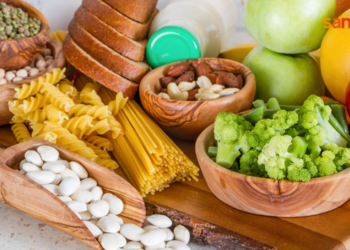As we age, our bodies undergo various changes that can impact our nutritional needs. Maintaining a balanced diet with essential nutrients is crucial to support overall health and prevent age-related conditions. Here are some key nutrients you need more of as you grow old.
1. Vitamin B12

Join Now >
Vitamin B12 is vital for keeping the nervous system running smoothly, forming red blood cells, and synthesizing DNA. Unfortunately, our ability to absorb B12 diminishes as we age, particularly after our 60s and 70s. A deficiency in B12 can lead to symptoms ranging from lethargy to severe neurological issues. To ensure adequate intake, consider incorporating foods such as meat, fish, eggs, and dairy products into your diet, or talk to your doctor about B12 supplements.
2. Vitamin B6
Vitamin B6, also known as pyridoxine, plays a critical role in maintaining a healthy central nervous system and supporting immune health. Foods rich in B6 include liver, fatty fish, chickpeas, dark leafy greens, bananas, and citrus fruits. Including these foods in your meals can help meet your daily requirements and promote overall well-being.
3. Magnesium
Magnesium is an essential mineral that many older adults lack. It is crucial for a variety of bodily functions, including muscle and nerve function, blood sugar control, and bone health. Unfortunately, 70 to 80 percent of adults over 70 do not get enough magnesium. Deficiency in this mineral can lead to sleep disorders, cognitive impairments, cardiovascular issues, type 2 diabetes, asthma, and depression. To boost your magnesium intake, consume foods like nuts, seeds, whole grains, and leafy green vegetables.
4. Omega-3 Fatty Acids
Omega-3 fatty acids, found in foods like fish and flaxseeds, are beneficial for brain health and heart health. Studies suggest that omega-3s can help reduce the risk of cardiovascular disease and improve lipid profiles in middle-aged and older adults. Incorporating fatty fish such as salmon, mackerel, and sardines into your diet a few times a week, or using flaxseed oil, can help you reap these benefits.
5. Vitamin D
Known as the “sunshine vitamin,” vitamin D is crucial for bone health and immune function. However, older adults often spend less time outdoors or wear clothing that limits sun exposure, making it difficult to get enough vitamin D naturally. This can lead to deficiencies that impact bone density and overall health. To counter this, include vitamin D-rich foods like fatty fish, fortified dairy products, and consider supplements after consulting with your healthcare provider.
6. Calcium
Calcium is essential for promoting bone health, nerve function, and muscle movements. It plays a significant role in preventing osteopenia and osteoporosis, especially in postmenopausal women who face a higher risk of bone loss. Dairy products, leafy greens, and calcium-fortified foods are excellent sources of calcium. Ensuring adequate intake can help maintain strong bones and reduce the risk of fractures.
7. Protein
As we age, we experience a gradual loss of muscle mass, known as sarcopenia, which can begin as early as our 40s. Protein is crucial for building and maintaining muscle mass. Include protein-rich foods such as lean meats, fish, beans, legumes, nuts, and dairy in your diet to help combat muscle loss and maintain strength and mobility.
8. Water
Our bodies are composed of about 60 percent water, but the sensation of thirst often diminishes with age, leading to a higher risk of dehydration. Staying adequately hydrated is vital for all bodily functions, including digestion, circulation, and temperature regulation. Make it a habit to drink water regularly throughout the day, even if you don’t feel thirsty, to ensure your body stays well-hydrated.
By prioritizing these essential nutrients, you can support your overall health and well-being as you age. A balanced diet, combined with regular check-ups with your healthcare provider, can help you navigate the nutritional challenges that come with getting older and enjoy a healthier, more vibrant life.








